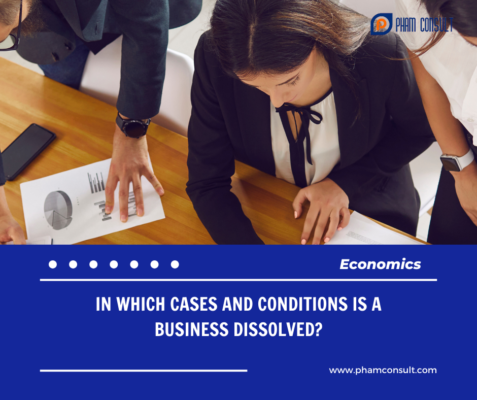For many different reasons, businesses are forced to carry out procedures for dissolving a business. However, the dissolution of a business can affect the interests of other organizations and individuals. Therefore, the law has strict regulations on the cases and conditions for dissolving a business. The following article will analyze What is business dissolution? In what specific cases and conditions is a business dissolved?

1. Concept of business dissolution
1.1. Definition
According to the Law Dictionary of the Institute of Legal Science, business dissolution is defined as “the procedure for terminating the existence of a business as a business entity by liquidating the assets of the business to pay debts to creditors”.
According to the Economic Law Textbook – Faculty of Law, National Economics University: “Dissolution of an enterprise is considered as the termination of a business operation, no longer existing in the market as a business entity”. Or in the Commercial Law Textbook, volume 1, Hanoi Law University, it is defined that “Dissolution of an enterprise is the process of terminating the existence of an enterprise under the condition that the enterprise is able to pay or guarantee payment of the enterprise’s financial obligations. Dissolution is a procedure for an enterprise to legally withdraw from the market”.
Thus, it can be seen that there are many definitions of enterprise dissolution, but they all share the same view that enterprise dissolution is the termination of the existence of an enterprise as a business entity.
1.2. Characteristics
Engineering dissolution is essentially a process to terminate the existence of an enterprise. When a business carries out dissolution procedures, all business activities of the business must stop, the business must liquidate assets, pay debts and other financial obligations. The business will be removed from the business registration book by the business registration agency, or its status will be updated on the national database of business registration, and from that point on, the business will no longer exist in the market.
Business dissolution is voluntary or compulsory. When the investor no longer needs to continue doing business or the business is losing money but not to the point of being unable to pay debts due, most will proceed with dissolution. In addition, if a business violates the provisions of the law and is subject to sanctions of suspension of operations and revocation of licenses, it will lead to forced dissolution, for example, in cases of falsifying business registration documents, illegal business, the number of members is reduced below the minimum level without handling and remedying within the time prescribed by law, etc.
Regardless of the reason for dissolution, the business can only be dissolved when it ensures payment of all debts and fulfillment of financial obligations. If it is unable to pay debts when due, the business falls under the case of applying bankruptcy law to terminate its operations.
The business owner is the one who decides to dissolve the business. To terminate its existence, the business must carry out many procedures such as procedures to terminate the validity of the tax code, return the seal, submit dissolution documents, remove the business name from the business registration book, etc. These are all procedures carried out at the business registration agency. The business registration authority has no authority to approve or object to the dissolution, but only considers the validity of the dissolution dossier and, if there are no complaints, will decide to update the “dissolved” status of the enterprise on the National Business Registration Information Portal.
2. Cases of enterprise dissolution
Clause 1, Article 207 of the 2020 Enterprise Law stipulates four cases of enterprise dissolution as follows:
2.1. The term of operation stated in the Company Charter ends without a decision to extend.
When establishing an enterprise, the members all aim for a certain goal and plan a specific time limit to complete that goal. This time limit will be stated in the Company Charter and when this time limit ends and the members do not request an extension, the company will proceed to dissolve.
2.2. According to the resolution, decision of the business owner for private enterprises, of the Board of Members for partnerships, of the Board of Members, the company owner for limited liability companies, of the General Meeting of Shareholders for joint stock companies.
When the owner, for some reason such as: loss, low profit, internal conflict, … does not want to continue business activities, they have the right to decide to dissolve their business. This is a voluntary and proactive decision from the business owner.
Clause 2, Article 207 of the Enterprise Law 2020 stipulates: “An enterprise may only be dissolved when it ensures payment of all debts and other property obligations and is not in the process of resolving disputes at Court or Arbitration. The relevant manager and the enterprise specified in Point d, Clause 1 of this Article shall be jointly responsible for the debts of the enterprise”. Thus, there are two conditions for carrying out the enterprise dissolution procedure:
First, the enterprise ensures payment of all debts and other property obligations.
In theory, the method of “ensuring payment of all debts and other property obligations” can be accepted as follows:
– Debts have been fully paid, as shown in the dissolution dossier.
– Some debts are committed to be paid by other organizations and individuals, including organizations and individuals who are owners of related enterprises, after the enterprise is dissolved. In this case, it is necessary to pay attention to the provisions on the transfer of obligations in the Civil Code.
– For the dissolution of a branch, the enterprise with the dissolved branch has the obligation to pay the debt, because in essence, the debts created from the branch’s operations are the debts of the enterprise.
Second, the enterprise is not in the process of resolving disputes at the Court or Arbitration.
This is a provision to ensure the maximum rights and interests of those related to the enterprise such as employees in the enterprise or creditors.




 VI
VI